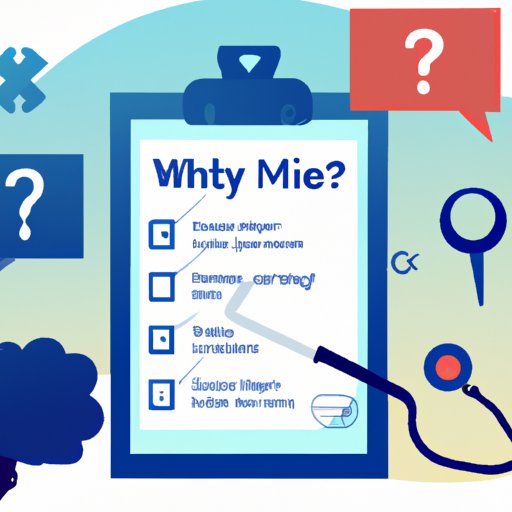Introduction
A mental health diagnosis is an important step in understanding and managing mental health conditions. It can provide support and direction in treatment, as well as help to alleviate any confusion or uncertainty. This article will provide an overview of how to get a mental health diagnosis, including making an appointment, researching types of mental illnesses and symptoms, describing your personal history, participating in physical and psychological tests, discussing feelings and thoughts with the professional, and asking questions about the diagnosis process.
Making an Appointment with a Mental Health Professional
The first step in getting a mental health diagnosis is to make an appointment with a qualified mental health professional. It’s important to find a professional who is experienced and knowledgeable in mental health diagnoses, and who you feel comfortable talking to. When searching for a professional, ask for referrals from friends and family, or use online resources such as Psychology Today or GoodTherapy.org.
Once you’ve found the right professional, it’s important to prepare for the first appointment. Make sure to bring any medical records, medications, and other relevant information that may be helpful in the diagnosis process. Be prepared to answer questions about your symptoms, lifestyle, and family history. Also, make sure to ask any questions you may have about the process.

Researching Types of Mental Illnesses and Symptoms
Before meeting with the mental health professional, it can be helpful to research different types of mental illnesses and their associated symptoms. This can help you identify potential diagnoses, as well as understand the symptoms better. Mental health organizations such as the National Alliance on Mental Illness (NAMI) and the American Psychiatric Association (APA) are good resources for this type of research.
It’s also beneficial to keep a journal of your experiences with mental illness. Writing down your thoughts, feelings, and behaviors can help the mental health professional better understand your condition and make an accurate diagnosis.
Describing Your Personal History to the Mental Health Professional
During the appointment, it’s important to be honest and open when describing your personal history. Be prepared to answer questions about your family, job, relationships, hobbies, and any other topics that may be relevant to the diagnosis. It’s also important to provide any information about any mental health issues you’ve had in the past, as well as any medications or treatments you’ve tried.
Be aware that the mental health professional may ask difficult questions about your thoughts and feelings. It’s okay to take time to think before responding, and it’s important to be honest and open about your experiences. It’s also okay to ask for clarification if something is unclear.

Participating in Physical and Psychological Tests
The mental health professional may also suggest participating in physical and psychological tests to help with the diagnosis process. Common tests used include blood tests, urine tests, brain scans, and psychological questionnaires. These tests can provide valuable insight into your mental health and help the professional make an accurate diagnosis.
It’s important to remember that these tests are not intended to diagnose a specific condition, but rather to provide more information about your overall mental health. The tests results can help the professional determine what type of treatment might be most effective for you.

Discussing Your Feelings and Thoughts with the Professional
In addition to physical and psychological tests, it’s important to discuss your feelings and thoughts with the mental health professional. Describe what you’re feeling, how long you’ve been feeling this way, and how it affects your life. Explaining your experience in detail can help the professional make an accurate diagnosis.
It’s also important to express your emotions during the appointment. If you feel angry, scared, or frustrated, it’s okay to say so. The mental health professional should be able to provide support and understanding throughout the process.
Asking Questions about the Diagnosis Process
Asking questions is an important part of the diagnosis process. Ask the mental health professional about the diagnosis process, including what tests they plan to use and how they plan to assess your symptoms. Make sure to ask about any potential side effects of medications or treatments, and request any additional information that may be helpful.
Also, ask questions about the timeline of the diagnosis process. Knowing when to expect results and updates can help reduce any anxiety or uncertainty you may be feeling.

Following Up with the Mental Health Professional for Feedback
Finally, make sure to follow up with the mental health professional for feedback. Keep in contact with the professional throughout the diagnosis process, and ask for regular updates. This will help you stay informed of any changes in your condition and provide reassurance that you’re receiving the best care possible.
Conclusion
Getting a mental health diagnosis can be a complex and intimidating process. However, by following the steps outlined in this article—making an appointment, researching types of mental illnesses and symptoms, describing your personal history, participating in physical and psychological tests, discussing feelings and thoughts with the professional, and asking questions about the diagnosis process—you can ensure that you receive the best possible care. Ultimately, seeking a mental health diagnosis can help provide clarity and understanding, as well as lead to successful treatment.


